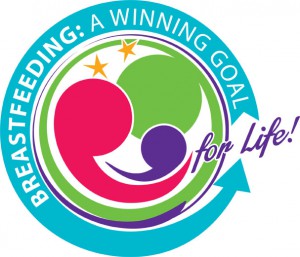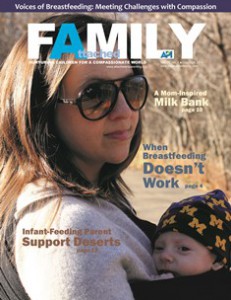By Sara Jones Rust
 My husband gently bounced our wailing 3-week-old son while pacing around our apartment. I quickly finished toweling off, ran a comb through my wet hair and threw on a comfy pair of post-baby pants and a T-shirt. Luckily I had the forethought to brush my teeth while in the shower, a time saver I had picked up over the last few weeks. I jumped into the corner of the couch that had recently become imprinted with my shape and adjusted the nursing pillow.
My husband gently bounced our wailing 3-week-old son while pacing around our apartment. I quickly finished toweling off, ran a comb through my wet hair and threw on a comfy pair of post-baby pants and a T-shirt. Luckily I had the forethought to brush my teeth while in the shower, a time saver I had picked up over the last few weeks. I jumped into the corner of the couch that had recently become imprinted with my shape and adjusted the nursing pillow.
“Okay, ready,” I said, refreshed from my shower and the savored last few moments without a child attached to me. Beckett screamed. His face was red with insistence that he was not pleased. His little arms, still the purplish hue of newborn skin, flailed around seemingly out of his control. My husband handed our extremely loud, squirming, 7-pound bundle to me with a look that said he was sorry he wasn’t able to keep him asleep any longer. It had only been 40 minutes since our last nursing session. I cradled Beckett in my arm, positioned him and quiet fell. He latched on and began sucking furiously. His wide eyes locked with mine in an intense stare, letting me know that milk was required now and anything less would not be tolerated. After all, I had let him down before. Then after a few moments, his gaze softened and his eyelids fluttered with the pleasure of warm milk.
Immediately after Beckett’s very fast birth—I dilated completely and delivered him in less than three hours—I had a postnatal hemorrhage. I passed out, and the midwife stopped the bleeding, but it scared my husband. I had to take some iron pills during my hospital stay, but other than that, it was fairly glanced over. Hours later, I felt good so I didn’t think to ask any questions.
Beckett was perfect: He barely cried, and I fed him every three hours per the nurse’s recommendation. He had some trouble latching on at first but caught on in the first 24 hours. My new little family, drunk with happiness, basked in the quiet timelessness that the hospital provides in those first days before we headed home, when the realities of having a newborn smacked us sober.
Before we were released from the hospital, the staff ran down a typical checklist. Beckett was small—just over 6 pounds at birth—and he’d lost weight and became jaundiced because my milk had yet to come in. This was typical, we were told. They discharged us, but we had to return the next day for a bilirubin test to see if his jaundice was gone.
That first night home was a shock. Beckett cried and continued to cry—all night. We changed, we burped, we bounced, we danced, we swung, we patted, we shushed and eventually we cried, too. The only thing that stopped him from crying was nursing, which I was doing every two to three hours, as the nurses told me to.
When he was four days old, he was still jaundiced and was now spending a good amount of time in a light box, which looks like a baby-sized tanning bed, to help his body get rid of the bilirubin that was causing jaundice. He’d only gained an ounce or two, and my milk still hadn’t come in.
I had been determined to breastfeed, and I was beginning to think it wasn’t going to happen. Beckett’s pediatrician was putting quite a bit of pressure on us to supplement with formula. I felt so helpless. I sobbed as I put the bottle in his mouth. He pushed it out a few times but eventually accepted it and sucked down the entire few ounces in a matter of minutes. I was worried he would stop nursing, that he would prefer the formula to my milk … if it ever came in. I felt I was letting him down.
But Beckett stuck with me, kicking and screaming, as it were. We kept up our nursing schedule. I had an app on my phone that alerted me every two hours. Finally, on the fifth day, my milk came in. Nothing could have made me happier. We ditched the formula, Beckett ditched the jaundice, and I took pride in and felt thankful that I was able to nourish my child the way I had planned—the way I felt was best for us.
I found out much later, in speaking with a lactation consultant, that the postnatal hemorrhage was most likely the cause for my stunted lactation. I’m not sure if I would have done anything differently, but it certainly would have alleviated some of my feelings of failure and guilt if I had known this.
Beckett began to pack on the ounces, but still his crying persisted. He would only sleep if he was being held. We counted the minutes until another feeding, because it was the only time he didn’t cry. Inevitably after he nursed, he’d fall asleep and we’d have a few moments of peace before he awoke, mid-scream, and we’d start counting down the minutes to feeding time again.
After two weeks of little sleep, we were at a pediatrician appointment when I had a moment that changed everything for us. Beckett was fit as a fiddle, but the doctor still wasn’t thrilled with his weight gain. It was good but not great. The doctor thought the crying might be colic and described it as unstoppable crying. To which I replied, “He stops when he’s nursing.”
“Hungry guy,” she said. Right at that moment, everything clicked. He’s just hungry! I couldn’t believe I had been so rigid in our feeding schedule. I immediately stopped thinking about schedules and instructions and just began to listen to my heart, the mom instinct that, like my milk supply, seemed also to be a little stunted. From then on, I nursed him whenever he was inconsolable. It ended up being a lot. I wondered if it was possible to nurse a baby too much. But I continued to let my gut overrule my paranoia.
Once I learned to listen to my son and to myself, things began to fall into place. At our following pediatrician visits, we were told that he was thriving and to keep doing whatever we were doing. It didn’t solve all of our problems by any means, but it began a practice of listening in our house that has served us well and, I am confident, will continue to.

